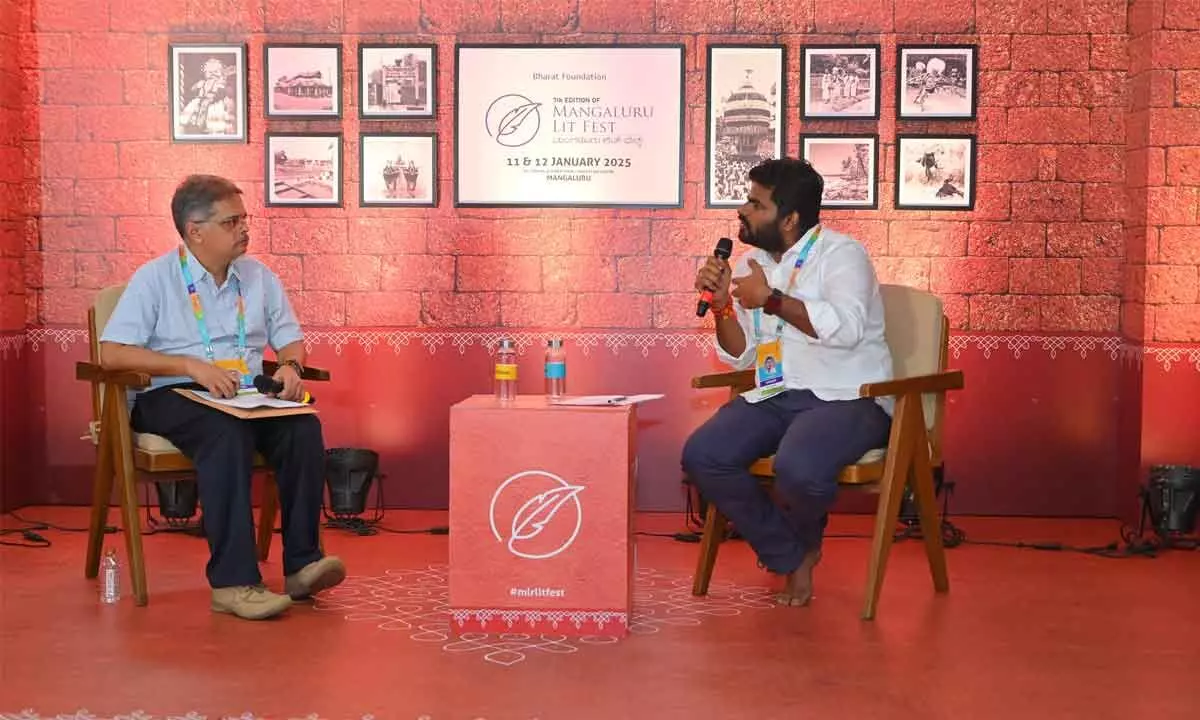Live
- Public Participation Key to Strengthening Democracy-Annamalai
- MLA Anirudh Reddy gets threat letter from Maoist
- "Awareness Program on Road Safety for Auto Drivers Held in Aija Town".
- MLA Bandla Krishna Mohan Reddy Inaugurates NPL Season-4 Cricket Tournament in Netivanipalli
- Rangoli Competitions Showcase Tradition and Creativity in Gadwal.
- "Vadde Obanna: A Revolutionary Hero’s Legacy Celebrated on His 218th Birth Anniversary".
- District Administration Accelerates Implementation of Welfare Schemes.
- Illegal Transportation of Gravel and Soil in Sankalmaddi Village Raises Concerns
- Weavers Celebrate Telangana CM Revanth Reddy’s Welfare Initiatives with Milk Ablution in Aiza.
- MLA Couple Attends Oath-Taking Ceremony of New Governing Body at Shri Shri Jamulamma Parashurama temple in Jammi chedu.
Just In
Public Participation Key to Strengthening Democracy-Annamalai


Public participation is essential for the effective functioning of democracy, according to Annamalai, the former IPS officer and Tamil Nadu BJP President.
Mangaluru : Public participation is essential for the effective functioning of democracy, according to Annamalai, the former IPS officer and Tamil Nadu BJP President. Speaking at the Mangaluru Lit Fest, he emphasised that a successful democracy requires not only citizens to assert their rights but also to actively engage in democratic processes at every level, particularly at the grassroots level. The discussion, titled "Democracy and Democratic Governance," was moderated by senior journalist Jaideep Shenoy.
Annamalai stressed that true democracy flourishes when people are not passive recipients of governmental benefits but are actively involved in decision-making and governance. He urged educated young people, especially from Tamil Nadu, to enter politics and take part in local governance, starting from the Panchayat level. “Participation is not just a right, but a fundamental duty,” he stated.
Expanding on his views on leadership, Annamalai pointed to Prime Minister Narendra Modi as an exemplary figure. “Understanding politics and executing its nuances is something Prime Minister Modi has demonstrated time and again,” he said, highlighting Modi’s approach of staying in touch with the public and showcasing a unique model of leadership, which has inspired many young people entering politics.
Addressing the issue of socio-economic changes, Annamalai noted that India is seeing a rise in the number of middle-class citizens, reflecting the benefits of economic development reaching broader segments of society. With these changes, however, comes the challenge of managing the growing healthcare needs of an increasing senior citizen population. Annamalai pointed out that this is a challenge faced by every country, but India, with its democratic setup, must navigate this issue effectively to ensure sustainable growth.
He also spoke about the rich tradition of public participation in India, referencing an example from a village near Kanchipuram, Tamil Nadu, where democratic governance existed over 1200 years ago. He emphasised that India’s grassroots democracy is not a recent import but a long-standing tradition.
Annamalai further criticised the practice of VIP culture in India, a sentiment shared by Prime Minister Modi. The BJP leader argued that the country should not foster VIP culture, which he believes creates unnecessary divisions in society. "Modi has demonstrated a different approach through his public interactions and reforms. He exemplifies how political leaders can stay connected with the people they serve,” Annamalai added.
On the issue of political compromises, Annamalai clarified that compromises are an inevitable part of politics. Citing historical examples, including Prime Minister Modi's strategic decision to wait until 2019 to revoke Article 370, Annamalai underscored that political decisions must often align with the right timing and atmosphere. He also recalled how former Prime Minister Atal Bihari Vajpayee had formed alliances with parties such as the DMK during his tenure, demonstrating the importance of strategic political compromise for broader national objectives.
Annamalai also spoke about the evolution of the Indian Constitution, noting that the terms “socialist” and “secular” were added during Indira Gandhi’s premiership, despite Dr. B.R. Ambedkar's opposition. According to Annamalai, Ambedkar believed the Indian social system was naturally secular, a viewpoint rooted in the inclusive nature of Hindu philosophy.
Addressing the controversial topic of Hindi as a national language, Annamalai clarified the government's stance on the issue, stating that the Modi administration’s third national education policy introduced a three-language system rather than designating any language as "national." He explained that the policy aims to promote linguistic diversity, with no language imposed as a national language.
In a spirited defence of Tamil Nadu’s patriotism, Annamalai noted the state’s overwhelming show of support for the nation when the former Chief of Defence Staff died in a helicopter crash. He accused the Dravidian parties of fostering division for political gain but expressed confidence that the state’s political landscape would eventually change.
When questioned about the government’s control over Hindu temples, Annamalai assured that should the BJP come to power in Tamil Nadu, the law governing government oversight of temples would be repealed.
The session, which attracted a large crowd, especially students and young people, reflected Annamalai’s broad appeal and the growing influence of his leadership within the state and beyond.

© 2025 Hyderabad Media House Limited/The Hans India. All rights reserved. Powered by hocalwire.com






